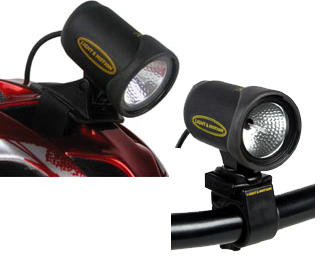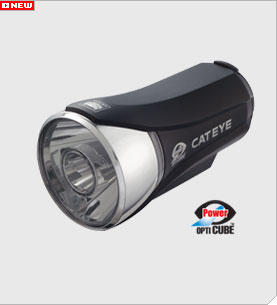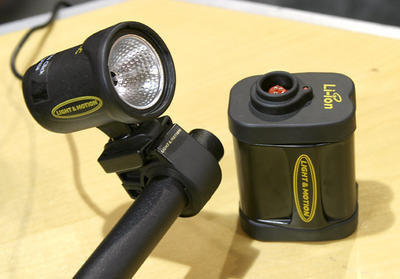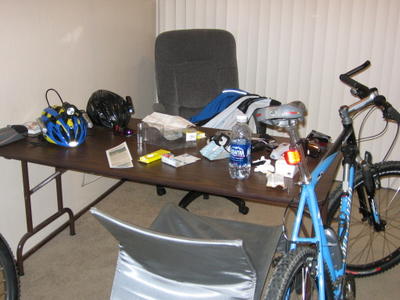Meet the Light & Motion ARC Li-ion:

The ARC Li-ion lighting system consists of an 11.1V 4.1Ah Lithium-ion battery that weighs at a feathery 300g, and a High Intensity Discharge (HID) Solarc lamp that weighs 170g with cable and connector. There are 2 outputs: "high setting" (@ 13.5W) is a stunning 675 Lumens, and "low setting" (@ 11W) is an impressive 550 Lumens. Wattage numbers appear deceiving until one realizes that HID bulbs have over 3 times the efficiency of a halogen bulb. Hence, this baby puts out about the same amount of light as a 45W halogen lamp.
A review of the lamp.
 While the ARC Li-ion is already very impressive with a run time of 3 hours on "High" and 3.5 hours on "Low," for peace of mind, I would rather carry an extra 175 grams and get the ARC Li-ion Ultra. The HID lamp head is identical. The only difference is a 475g Li-ion battery that is good for 5 hours on "High" and 6 hours on "Low." Well worth the added weight, IMHO.
While the ARC Li-ion is already very impressive with a run time of 3 hours on "High" and 3.5 hours on "Low," for peace of mind, I would rather carry an extra 175 grams and get the ARC Li-ion Ultra. The HID lamp head is identical. The only difference is a 475g Li-ion battery that is good for 5 hours on "High" and 6 hours on "Low." Well worth the added weight, IMHO.Eddy's Bike Shop has a light shoot out of the lights in his basement. Comments in italics are Eddy's.
 Projection wall with the lights on.
Projection wall with the lights on.How Bright is that Light?
We took a few of our most popular lights down to the basement. The test is to show how bright these lights are and what the beam pattern is like. Each light was projected on a wall from 15 ft. away. On the wall we have numbers placed in increments of 3 ft starting with zero. The light is then aimed at the zero and turned on. This gives you an opportunity to check out the light beams and patterns on various lights.
 The auxiliary lights on either side of my helmet (and my housemate's) are the Cateye HL-EL400.
The auxiliary lights on either side of my helmet (and my housemate's) are the Cateye HL-EL400. 
As you can see...the EL400 puts out a pretty bright and focused beam. It gives you the ability to see the zero pretty well. This light falls under the category of being seen. The flashing mode makes this light a good light for pre-dusk riding.
 Mounted on my handlebar is the Cateye HL-EL300.
Mounted on my handlebar is the Cateye HL-EL300. The Cateye EL300 offers a very bright light for being LED. The light is also very focused. As you can see the zero is easily read. This is one of the brightest LED lights that we tested. It's also one of the largest LED lights we tested being that it has 5 Opticube LED's.
The Cateye EL300 offers a very bright light for being LED. The light is also very focused. As you can see the zero is easily read. This is one of the brightest LED lights that we tested. It's also one of the largest LED lights we tested being that it has 5 Opticube LED's. My housemate opted for the more powerful (and more expensive) Cateye EL-500 for his handlebar. Instead of 5 LEDs, the EL400 uses a single 1W Luxeon Star LED. Also, unlike the EL300, the EL400 utilizes a magnetic switch and is water resistant to 100 ft.
My housemate opted for the more powerful (and more expensive) Cateye EL-500 for his handlebar. Instead of 5 LEDs, the EL400 uses a single 1W Luxeon Star LED. Also, unlike the EL300, the EL400 utilizes a magnetic switch and is water resistant to 100 ft. The Cateye EL500 light is a good starter for riding at night. The beam pattern is focused, but not too focused. This light makes the zero easy to read but also gives you the ability to view the 3. The Cateye EL500 has a beam pattern that gives you a 6 foot viewing radius.
The Cateye EL500 light is a good starter for riding at night. The beam pattern is focused, but not too focused. This light makes the zero easy to read but also gives you the ability to view the 3. The Cateye EL500 has a beam pattern that gives you a 6 foot viewing radius. And the diva of the night is the Light & Motion ARC Li-ion HID lamp. Although she takes 15 to 30 seconds to power up (the HID bulb requires 25,000 volts from the ballast for initial start up), once she gets going, the light output is nothing short of remarkable.
And the diva of the night is the Light & Motion ARC Li-ion HID lamp. Although she takes 15 to 30 seconds to power up (the HID bulb requires 25,000 volts from the ballast for initial start up), once she gets going, the light output is nothing short of remarkable. Are you trying to recreate the sun on the trail? This is the light for you. This baby puts out a fluid beam that doesn't leave any spot without light. As you can tell... this light doesn't have a large "hot spot" like the Niterider version. It seems to put out a more fluid beam that tapers off. The Light & Motion ARC also gives you a great view of our entire basement. This light is a powerhouse for night riding.
Are you trying to recreate the sun on the trail? This is the light for you. This baby puts out a fluid beam that doesn't leave any spot without light. As you can tell... this light doesn't have a large "hot spot" like the Niterider version. It seems to put out a more fluid beam that tapers off. The Light & Motion ARC also gives you a great view of our entire basement. This light is a powerhouse for night riding. The lights weigh more than my helmet. In the center, the ARC HID light. On the left and right, Cateye HL-EL400 triple LED lights. I can significantly reduce the weight of the Cateyes by replacing the 3 AAA alkaline batteries in each with pricier lithium equivalents. Although lithium AAA batteries cost more ($5.95 for two, compared to $1.85 for 2 Duracell / Energizer batteries), they not only weigh 33% less but drive the lights 5 times longer, with equal or greater light intensity. If weight is a concern, it is worth the coin, IMHO.
The lights weigh more than my helmet. In the center, the ARC HID light. On the left and right, Cateye HL-EL400 triple LED lights. I can significantly reduce the weight of the Cateyes by replacing the 3 AAA alkaline batteries in each with pricier lithium equivalents. Although lithium AAA batteries cost more ($5.95 for two, compared to $1.85 for 2 Duracell / Energizer batteries), they not only weigh 33% less but drive the lights 5 times longer, with equal or greater light intensity. If weight is a concern, it is worth the coin, IMHO. My housemate decided to come along. Midway rigging up his bike for the night ride. (Yes, that's a big bike. A 23" frame to be exact).
My housemate decided to come along. Midway rigging up his bike for the night ride. (Yes, that's a big bike. A 23" frame to be exact). Golden Gate Bridge from the south. Housemate on the right, with the lights on his helmet.
Golden Gate Bridge from the south. Housemate on the right, with the lights on his helmet. A somewhat better shot. I suck at night photography, especially without a tripod.
A somewhat better shot. I suck at night photography, especially without a tripod. Crossing the bridge at about 2 AM.
Crossing the bridge at about 2 AM. View of the bridge from the north.
View of the bridge from the north. A closer look.
A closer look.At this point, we turned back as my housemate was feeling unwell. We didn't manage to hit the trails tonight. Still, it was a wonderful and unusual night though. There was hardly any wind, and it was actually relatively warm (about 64 F / 18 C).
Since I didn't get to use the ARC on the ride, on the way back to the car in San Francisco, I engaged in some juvenile (and illegal) antics by stunning drivers with it. It is tantamount to aiming a stadium light at someone. I could see right into the interior of a passing car, what clothes the driver is wearing, the cut and pattern of his clothes, the "deer caught in headlights" stunned look of his passenger going "WTH is that?" It was priceless.
 Route on a 1:100K map.
Route on a 1:100K map. Elevation profile.
Elevation profile. 1:24K map.
1:24K map.Some data:
Total distance: Cyclo-computer 9 miles (14.4 km) / GPS 9.67 miles (15.5 km) / TOPO! 9.27 miles (14.8 km)
Total elevation climbed: Altimeter 580 ft (177 m) / GPS + TOPO! 772 ft (235.4 m)
Temperature range: 62 F (16.6 C) to 64 F (17.7 C)

2 comments:
Hi--
Enjoyed your discussion of your L&M Li-Ion.
A question for you: Since the HID is so bright, why do you add those little flashlights to the side of your helmet? You mention that the setup is heavy, but I'm betting if you rode with just the HID you would be more comfortable. And those little flashlights can't be visible when the HID is on anyway.
--DJ W W
Hey DJ WW,
IIRC, it is questionable whether helmet-mounted HID bicycle lights are legal on public roads in California, hence the reason for the 2 little flashlights on the sides of the helmet. The side facing the sidewalk is set to constant mode to supplement the handlebar light in illuminating the road, and the side facing traffic is set to blinker mode to increase visibility. The HID remains off until I hit the trails.
Thanks for dropping by :-D
-ben
Post a Comment